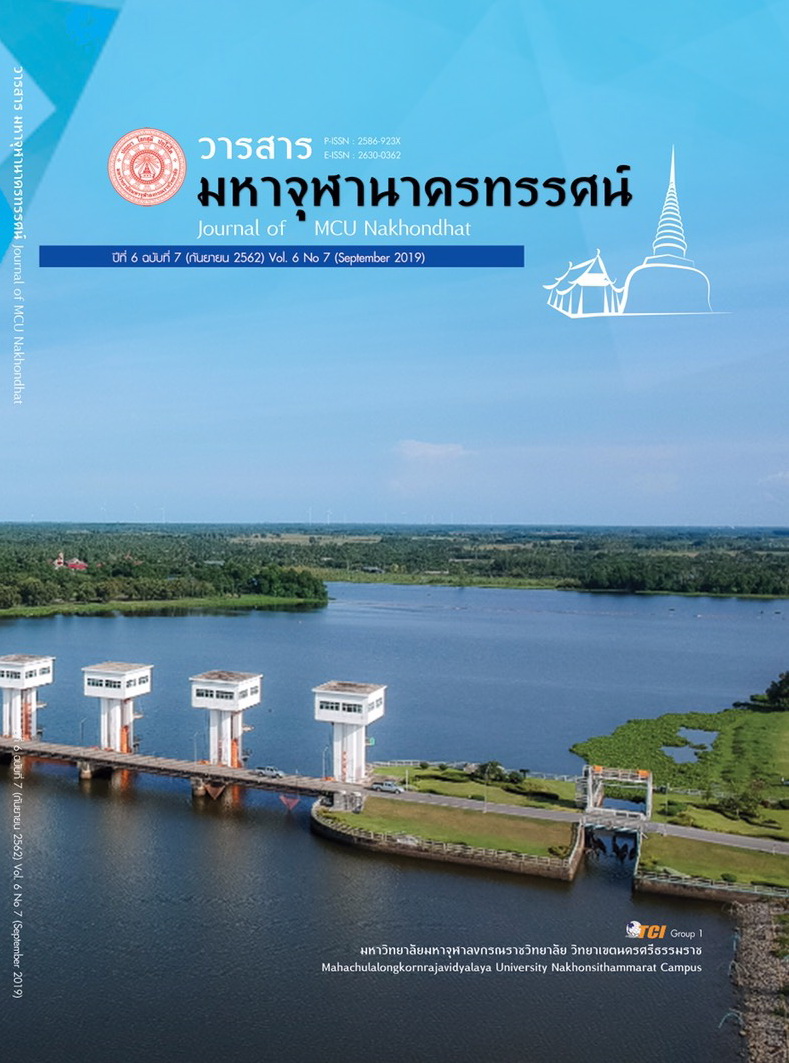DEVELOPMENT OF MANAGEMENT MODEL FOR PRIMARY EDUCATIONAL SERVICE AREA OFFICES ACCORDING TO PUBLIC SECTOR MANAGEMENT QUALITY AWARD (PMQA)
Main Article Content
Abstract
The purposes of this research were 1) to analyze the present condition and needs for management of Primary Educational Service Area Offices according to public sector management quality award; 2) to develop a management model accordingly; and 3) to test and evaluate the management model. The subjects of the study were 125 directors of Primary Educational Service Area Offices, 3 experts in educational management, and 9 experts in public sector management consisting of 3 academicians with expertise or work concerning public sector management during 2013 – 2015, 3 high-level education administrators of the Ministry of Education, and 3 directors of Primary Educational Service Area Offices who were successful in administration. Data were analyzed using mean, standard deviation, content analysis, and modified priority needs index (PNImodified).
The study results revealed as follows:
- The present overall condition of the management of Primary Educational Service Area Offices according to public sector management quality award in all 7 categories was at a high level. When considered by category, it was found that Category 1 Leadership, and Category 2 Strategic Planning had the same highest means (mean = 4.05.), followed by Category 7 Results of Implementation (mean = 4.00), and Category 6 Process Management with the lowest mean (mean = 3.89). Regarding the overall need for management of Primary Educational Service Area Offices according to public sector management quality award in all the seven categories, it was at the highest level. When considered by category, it was found that Category 1 Leadership had at the highest mean (mean = 4.63), followed by Category 2 Strategic Planning, and Category 4 Measurement, Analysis, and Knowledge Management with the same mean (mean = 4.61), and Category 6 Process Management with the lowest mean (mean = 4.57). For the study results concerning the present condition and the needs for management of Primary Educational Service Area Offices according to public sector management quality award, it was found that the means for the needs for management of Primary Educational Service Area Offices according to public sector management quality award were higher than those for the present condition of the management of Primary Educational Service Area Offices according to public sector management quality award in all the seven categories. The results of the test of the modified priority needs (PNImodified) revealed that Category 6 Process Management had the highest PNImodified value (0.26), followed by Category 4 Measurement, Analysis, and Knowledge Management (PNImodified = 0.17), and Category 2 Strategic Planning with the lowest PNImodified value (0.13).
- The management model for Primary Educational Service Area Offices according to public sector management quality award consisted of three stages according to the systems theory: 1. Input, 2. Process, and 3. Output, outcome and feedback. Input consisted of man, money, materials, management, and motivations which were the starting point and important mechanisms of the organization. Process consisted of public sector management quality award which comprised 1) leadership, 2) strategic planning, 3) stakeholders, 4) measurement, analysis, and knowledge management, 5) human resources management, 6) process management, and 7) results of implementing Ministry of Education policies and strategies. Output consisted of effectiveness and outcome which were quality of management of Primary Educational Service Area Offices with feedback as data and information for organizational quality development in the following years
3. The management model for Primary Educational Service Area Offices according to public sector management quality award was found to be suitable and feasible for implementation.
Article Details
References
ชไมพร เทือกสุบรรณ. (2553). ประสิทธิผลของการนำนโยบายการบริหารกิจการบ้านเมืองที่ดีไปปฏิบัติในกรมที่ดิน : กรณีการนำตัวชี้วัดการพัฒนาคุณภาพการบริหารจัดการภาครัฐ (PMQA) มาปฏิบัติ. ใน รัฐศาสตรมหาบัณฑิต สาขาบริหารจัดการสาธารณะ . มหาวิทยาลัยธรรมศาสตร์.
ชัยยุทธ์ เหลืองบุศราคัม. (2552). ความพึงพอใจต่อการดำเนินงานพัฒนาคุณภาพการบริหารจัดการภาครัฐของบุคลากร สำนักงานกรมปศุสัตว์ จังหวัดนครนายก. นครนายก: สำนักงานปศุสัตว์จังหวัดนครนายก.
ธงชัย สันติวงษ์. (2541). ทฤษฏีองค์การและการออกแบบองค์การ. กรุงเทพมหานคร: ไทยวัฒนาพานิช.
ธนษณุ รอดรักษา. (2553). คุณภาพการบริหารจัดการภาครัฐขององค์กรปกครองส่วนท้องถิ่นกรณีศึกษา เทศบาลนครสมุทรสาคร. วารสารวิทยบริการ, 21(3), 92-106.
นครชัย ชาญอุไร. (2554). การพัฒนารูปแบบการใช้ผลการประเมินคุณภาพภายนอกเพื่อพัฒนาคุณภาพโรงเรียนขนาดเล็กในภาคตะวันออกเฉียงเหนือ. ใน ปรัชญาดุษฎีบัณฑิต สาขาการบริหารและพัฒนาการศึกษา. มหาวิทยาลัยมหาสารคาม.
บุญเชิด ชำนิศาสตร์. (2556). การพัฒนารูปแบบการบริหารวิชาการในการจัดการศึกษาปฐมวัยของสถานศึกษาสังกัดสำนักงานเขตพื้นที่การศึกษาประถมศึกษาเพชรบุรี. ใน ปรัชญาดุษฎีบัณฑิต สาขาการศึกษา. มหาวิทยาลัยสยาม.
เบญจา ยอดดำเนิน แอ็ตติกจ์ และกาญจนา ตั้งชลทิพย์. (2552). การวิเคราะห์ข้อมูลเชิงคุณภาพ : การจัดการข้อมูล การตีความและการหาความหมาย. นครปฐม: สถาบันวิจัยประชากรและสังคม มหาวิทยาลัยมหิดล.
มะยม โพธิสุวรรณ. (2556). การพัฒนาคุณภาพการบริหารสำนักงาน ก.ค.ศ. ตามเกณฑ์คุณภาพการบริหารจัดการภาครัฐ (PMQA) การศึกษาส่วนบุคคล การพัฒนาหลักสูตรพัฒนานักบริหารระดับสูง กระทรวงศึกษาธิการ (นบส.ศธ.) รุ่นที่ 3. สำนักงานปลัดกระทรวง กระทรวงศึกษาธิการ.
เรขา ศรีวิชัย. (2554). รูปแบบการบริหารงานสถานศึกษาเอกชนระดับปฐมวัยที่มีประสิทธิผลในจังหวัดนนทบุรี. ใน ปรัชญาดุษฎีบัณฑิต สาขาวิชาบริหารการศึกษา. มหาวิทยาลัยศรีปทุม.
วรรณศรี แววงาม. (2555). เกณฑ์คุณภาพการบริหารจัดการ (PMQA) วิทยาลัยการสาธารณสุขสิรินธรตามทัศนะของบุคลากร. ใน สาธารณสุขศาสตรมหาบัณฑิต สาขาสาธารณสุข. มหาวิทยาลัยบูรพา.
สมหมาย เทียนสมใจ. (2556). รูปแบบการบริหารงานที่มีประสิทธิผลของสำนักงานเขตพื้นที่การศึกษาประถมศึกษา. ใน ปรัชญาาดุษฎีบัณฑิต สาขาวิชาการบริหารการศึกษา. มหาวิทยาลัยศิลปากร.
สิทธิชัย เจริญพิวัฒพงษ์. (2552). การพัฒนาระบบการประกันคุณภาพภายในตามแนวทางการบริหารงานแบบมุ่งคุณภาพทั้งองค์การสำหรับโรงเรียนอนุบาลเอกชน. ใน ครุศาสตรดุษฎีบัณฑิต สาขาบริหารการศึกษา. จุฬาลงกรณ์มหาวิทยาลัย.
สุดารัตน์ เลศงาม. (2553). ความคิดเห็นของบุคลากรต่อการพัฒนาคุณภาพการบริหารจัดการภาครัฐ : ศึกษาเฉพาะกรณี จังหวัดสมุทรสงคราม. ใน รายงานการวิจัย. มหาวิทยาลัยเกษตรศาสตร์.
สุวิมล ว่องวาณิช. (2550). การวิจัยประเมินความต้องการจำเป็น. กรุงเทพมหานคร: จุฬาลงกรณ์มหาวิทยาลัย.
อรวลัญช์ ณรงค์เดชา. (2554). ความพร้อมของบุคลากรของกรมพัฒนาสังคมและสวัสดิการเพื่อเข้าสู่เกณฑ์คุณภาพการบริหารจัดการภาครัฐระดับก้าวหน้า. ใน สังคมสงเคราะห์ศาสตรมหาบัณฑิต สาขาการบริหารและนโยบายสวัสดิการสังคม. มหาวิทยาลัยธรรมศาสตร์.
Cronbach, L. J. (1990). Essentials of Psychological Testing. (5thedition). New York: Harper Collins.
Keeves, J. P. (1988). Model and Model Building Educational Research Methodology and Measurement : An international Handbook. Oxford: Pergamon Press.
Lunenburg Fred C. and Orinstein Allan C. (2008). Education administration: concept and pratices 5th ed. Wardsworth: Cengage Learning.
Steiner, L. (1988). Organizational Dilemmas as Barriers to Learning. The Learning.

